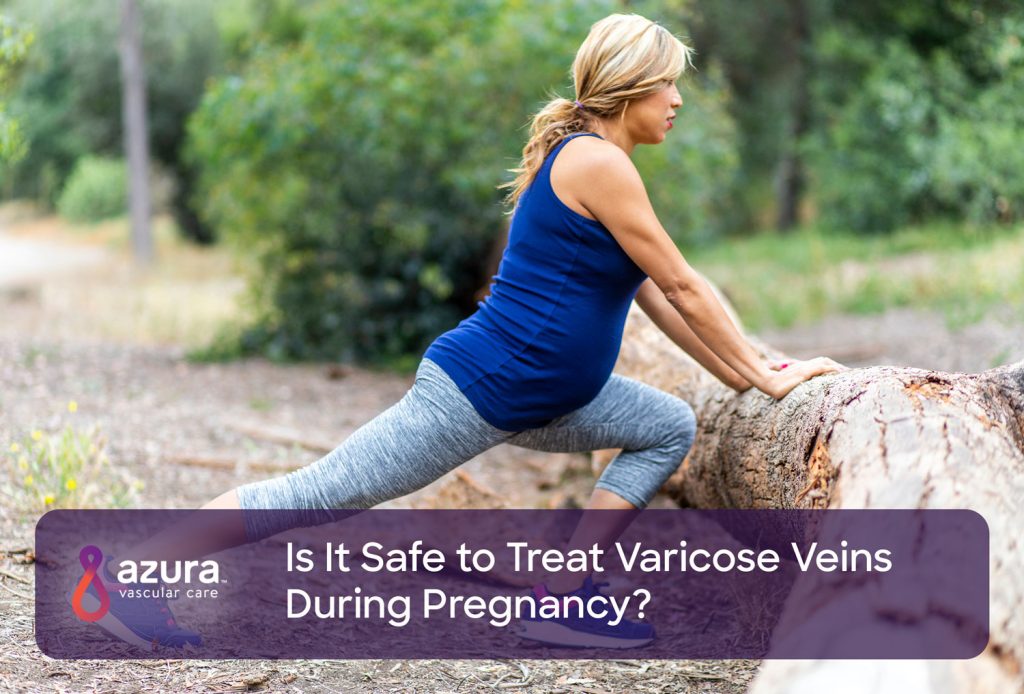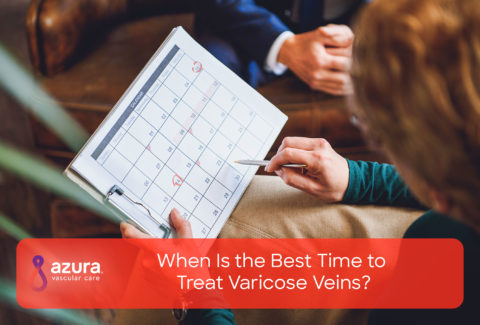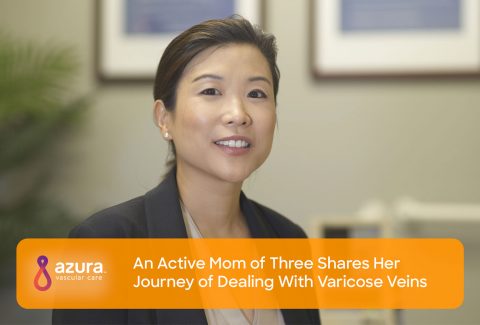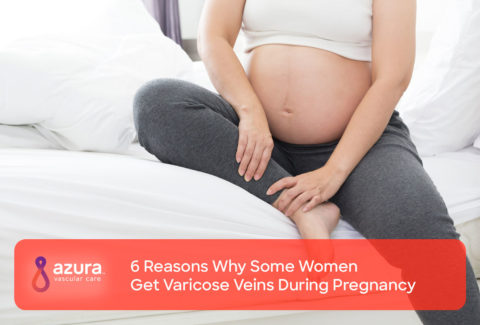
You have blue or purple bulging veins on your legs…and you’re pregnant. Are you wondering what should you do? If these unsightly veins are causing major discomfort during your pregnancy, you should speak with a physician who can discuss the options for managing your varicose veins during pregnancy and treatment options.
What Causes Varicose Veins During Pregnancy?
Leaky one-way venous valves and weak vein walls are the cause of varicose veins. During pregnancy, you’re more at risk to develop varicose veins because you have:
- An increased amount of blood in your veins, stressing them beyond normal.
- A higher level of progesterone, the pregnancy hormone, that relaxes the walls of your veins, making them more likely to swell.
- A growing uterus that pushes against the pelvic veins, making it harder for the leg veins to drain into them. (i)
While many women simply don’t like how varicose veins make their legs look, you could be experiencing other problems beyond just the appearance of your varicose veins. Treating your varicose veins can not only make your legs look better, but it can also alleviate the following leg symptoms:
- Swollen feet, legs or ankles
- An uncomfortable, heavy feeling in your legs
- Leg cramps or throbbing
- Itchy ankles
- Discolored skin around your veins (ii)
Related: 6 Hidden Dangers if You Don’t Treat Varicose Veins
Managing Symptoms of Varicose Veins During Pregnancy
Most often, surgery and minimally invasive procedures to treat varicose veins are avoided during pregnancy because there is usually too much risk.(iii) There are, however, a number of ways you can safely and often effectively manage your varicose veins while pregnant.
- Exercise – Walking or other exercises that use your leg muscles helps transport blood out of your legs. Talk with your obstetrician to see what kind of exercise program is safe for you.
- Wear flats – Choose your footwear wisely! High heels may make your legs look slimmer, but they also make it harder for the leg muscles to help move blood through your veins. Except for maybe on special occasions, you may want to save the high heels to wear when you are no longer pregnant.
- Support your veins –During pregnancy, support hose can help counteract the increased pressure within the veins. Full hose or thigh-high stockings are the best option when you are pregnant. Put them on in the morning, but take them off when you go to bed.
- Don’t cross your legs – Crossing one leg over the other blocks the flow of blood through your veins and can cause pressure to build up.
- Change positions – If you need to sit or stand all day at work, it’s best to change positions as often as you can. This prevents blood from pooling in your legs.
- Sleep on your left side – As your pregnant belly gets bigger, it becomes increasingly more uncomfortable to lay on your back. If you have varicose veins, you should try to sleep on your left side rather than your right. This prevents your uterus from pushing against the veins in your abdomen and helps blood move out of your legs at night.
- Elevate your legs – Throughout the day, take some time to put your legs up. Ideally, they should be above the level of your heart so the power of gravity can pull blood out of your legs. When you are in bed, you can prop your feet up on a pillow to help the blood flow while sleeping.
- Watch your salt – Eating a lot of salt pulls more fluid into your blood vessels which may increase the pressure in your veins. Excess fluid can move out into the tissues of your leg and make your leg or ankle swell. Drink plenty of water to help your body maintain proper fluid balance.
- Watch your weight – Your body changes a lot when you’re pregnant, and one of those changes is obviously your weight. Weight gain during pregnancy is expected, but the more you weigh, the more pressure you’re placing on your veins. This is even worse if you gain a lot of weight very quickly. Your obstetrician can tell you how much weight you should be gaining in between each of your appointments.(iv)
Do be patient with your body. Many times, varicose veins will go away about 3 months after your baby is born. If the varicose veins do not go away after 3 months, you may want to find a vascular specialist who can determine the severity of your condition.
Dr. Elsie Koh, a board-certified Interventional Radiologist with Azura Vascular Care, specializes in complex vein cases and advises, “If you had a very bad varicose vein experience during pregnancy and you’re considering having another child, I recommend consulting with a vascular expert. You may need to consider treating your varicose veins before the next pregnancy, which potentially can be worse than the one before.”
Sources:
(i) Mayo Clinic, Varicose veins and pregnancy: Legs and more. http://www.mayoclinic.org/healthy-lifestyle/pregnancy-week-by-week/expert-blog/varicose-veins-and-pregnancy/bgp-20055799
(ii) National Heart, Lung and Blood Institute. What Are the Signs and Symptoms of Varicose Veins? https://www.nhlbi.nih.gov/health/health-topics/topics/vv/signs (updated 2/13/2014, accessed 11/30/2016)
(iii) Varicose Veins in the Legs: The Diagnosis and Management of Varicose Veins. NICE Clinical Guidelines, No. 168. National Clinical Guideline Centre (UK). London: National Institute for Health and Care Excellence (UK); 2013 Jul.
(iv) American Pregnancy Association, Treating Varicose Veins Naturally During Pregnancy. http://americanpregnancy.org/naturally/treating-varicose-veins-naturally-during-pregnancy/ (reviewed 9/2/2016, accessed 12/15/2016)



